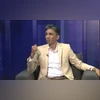The relationship between journalists and state surveillance is as old as the profession itself, though surveillance methods have evolved with advancing technology. In Pakistan, however, veteran journalist Azaz Syed recently revealed that while the government may be keen on surveillance, the technology remains as outdated as the economic challenges facing the nation.
In a post on social media platform X (formerly Twitter), Syed shared that his mechanic, while installing a new number plate, found a tracking device secretly attached to his vehicle. “It appears this may be the work of a state agency. It’s deplorable that our agencies are targeting journalists instead of pursuing terrorists. I urge policymakers to reconsider their priorities,” he stated.
IMPORTANT: public service message here from @AzazSyed and @asifbashirch. Must watch: pic.twitter.com/IoRCDSyOFN
— Abdul Moiz Jaferii (@Jaferii) October 29, 2024
Speaking with senior journalist Asif Bashir Chaudhry, Syed poked fun at Pakistan’s intelligence agency for using "old technology." He pointed out that while modern GPS devices are compact and lightweight, the device he encountered was large and cumbersome.
Sarcastically, he remarked, “I expect Pakistan’s intelligence agencies to be smart enough so at least I don’t catch your spying devices.”
More From This Section
Syed expressed disappointment, noting that Pakistan’s intelligence agencies should be advanced enough to avoid such detection, especially when tracking mundane activities he would willingly disclose if asked. “Why waste resources on such petty things?” he questioned.
Reflecting on the outdated technology, Syed observed that these devices were common in the mid-1990s yet were still in use in 2024, which he found embarrassing. He criticised the agency, saying, “They must be surveilling others with this technology only. It is embarrassing. Aap nalayak hai. Aap thoda smart ho jaiye.”
Previous attempts on Syed’s life and kidnapping
Azaz Syed has faced frequent criticism and threats within Pakistan due to his journalism. Earlier this month, the Human Rights Commission of Pakistan (HRCP) publicly supported Syed after he received serious threats from extremist groups linked to his reporting.
In a post on X, the HRCP expressed solidarity with Syed, noting that he had been threatened by extremist groups in response to his work. The HRCP called for these threats to be addressed, urging accountability for those promoting violence, and requested that the state provide Syed with adequate protection.
Syed became the target of threats and online harassment after critically commenting on blasphemy allegations and rising extremism in Pakistan. He reportedly condemned the targeting of the Chief Justice of Pakistan’s Supreme Court, Qazi Faez Isa.
Since his appointment as Chief Justice in November of the previous year, Qazi Faez Isa has faced death threats and public protests, especially after ordering the release of an Ahmadiyya man, Mubarak Sani, in a blasphemy case. Syed shared on X that he was subjected to threats and harassment after speaking against the mistreatment of the Chief Justice, claiming the campaign was allegedly orchestrated by Allama Saad Rizvi of Tehreek-e-Labbaik.
In 2017, Syed narrowly escaped an attempted abduction when a masked man on a motorcycle blocked his path near Park Road by Banigala police station. Pursued by a car, the assailants demanded he leave his vehicle, but Syed managed to escape and sought refuge at a nearby police station.
Known for his pointed questions during press conferences, Syed’s home was attacked in 2010, with damage inflicted on his car.
Pakistan is recognised as one of the most dangerous countries for journalists, with at least 60 journalists killed since 1992, according to the Committee to Protect Journalists.
In 2014, Hamid Mir survived an assassination attempt when gunmen opened fire on his vehicle en route to Geo’s Karachi office.

)